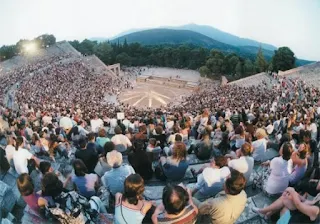Greece: Ancient theatre of Epidaurus restarts performances with social distancing rules
Athens, Greece: Almost five months since the coronavirus pandemic shuttered theatres across the world, several thousand theatre-goers attended on Friday, July 24 the first major theatrical production staged in Greece, at the ancient amphitheatre of Epidaurus with a stripped-down production of the oldest surviving play in the canon: Aeschylus' 'The Persians'.
The performance, produced by the National theatre of Greece, was one of the 70 events originally planned pre-pandemic by the annual Athens and Epidaurus festival. Now, only 17 of these, mostly musical productions, will be staged. But even this version of the festival - called Fragment - almost didn't happen at all. "There was a time when the (coronavirus) situation was escalating and we were pretty sure that none of this would happen, and we would be unable to have a festival actually this year," Katerina Evangelatos, the artistic director of the festival told.
But after working closely with the health and culture ministries, Evangelatos and her team devised a special seating plan for all the open-air venues, hired more ushers for crowd management and asked audience members to wear masks upon entering and leaving the theatre, in order to salvage some part of this 65-year-old summer tradition.
The actors too, were apprehensive of having to rehearse and act with masks and social distancing, as well as having to perform to a half-empty theatre, as the social distancing rules mandated that open-air venues should operate at 40 percent capacity. About three thousand curious theatre-goers arrived, sitting on cushions separated by a white ribbon indicating the distance that should be kept from other audience members.
"It is very strange to see a supposedly sold-out show, and the theatre is half-empty, there is no set design - it's a unique experience, very minimal. We are very curious and anxious to see how this plan and directorial vision will all work out under these new circumstances," said theatre-goer, Nikos Roubis as he arrived.
The stage was bare apart from several chairs, and the nine-member chorus of Persian elders, dressed in simple white gowns moved in unison, but by holding long poles in each hand, also managed to keep social distance while performing.
The play's director, Dimitris Lignadis said he wanted to be optimistic about the end of the pandemic, but acknowledged that, while "nothing can replace theatre," the immediate future for those working in the culture sector would most likely be difficult, as audience members might be reluctant to enter closed venues in the upcoming winter season. In a first for the 2,300-year-old venue, Saturday's July 25 performance will be live-streamed.
'The Persians' is the second part of a lost trilogy by Aeschylus, that was first performed in 472 B.C., and won the first prize at the city of Athens' Dionysia festival. It relates the aftermath of the Battle of Salamis in 480 B.C. from the point of view of the defeated Persians.



















